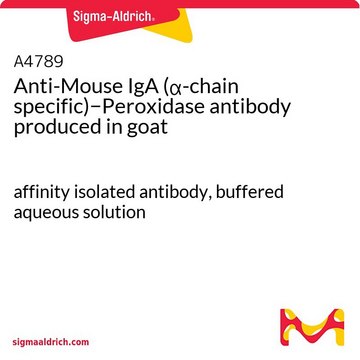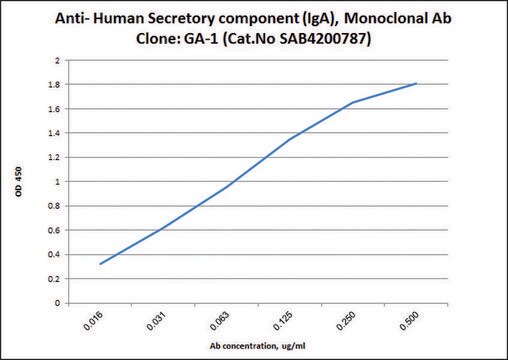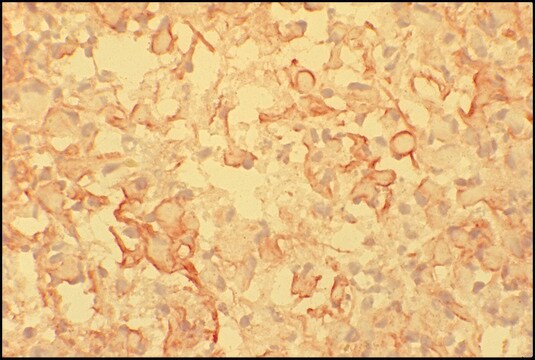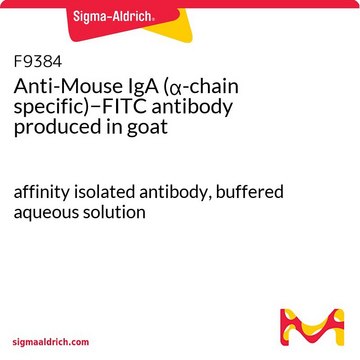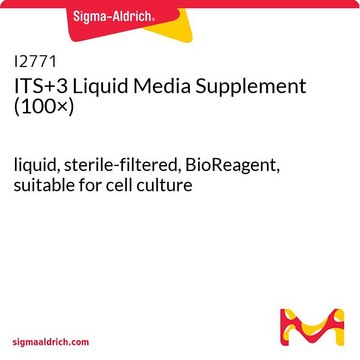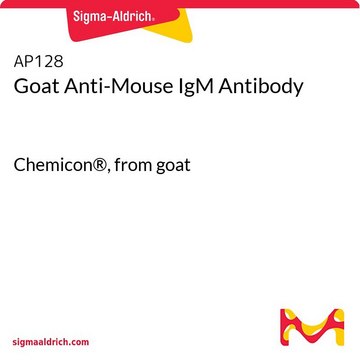M1272
Anti-Mouse IgA (α-chain specific) antibody produced in sheep
affinity isolated antibody, lyophilized powder
Sign Into View Organizational & Contract Pricing
All Photos(1)
About This Item
Recommended Products
biological source
sheep
Quality Level
conjugate
unconjugated
antibody form
affinity isolated antibody
antibody product type
secondary antibodies
clone
polyclonal
form
lyophilized powder
technique(s)
Ouchterlony double diffusion: suitable
storage temp.
2-8°C
target post-translational modification
unmodified
General description
IgA antibody is secretory antibody and is present abundantly in mucous linings of gastrointestinal, respiratory and genitourinary tracts, tears and saliva. Thus secretory IgA contributes to the humoral defense mechanism against the pathogens on mucosal surfaces
Anti-Mouse IgA (α-chain specific) is specific for α chain of mouse IgA.
Anti-Mouse IgA (α-chain specific) is specific for α chain of mouse IgA.
Immunogen
Purified mouse IgA (myeloma protein)
Application
Anti-Mouse IgA (α-chain specific) is suitable for Ouchterlony Double Diffusion. The antibody was used to detect antigens to Helicobacter hepaticus in mice serum using a concentration of 5 μg/ml.
Physical form
Lyophilized from 0.01 M sodium phosphate, 0.015 M sodium chloride, pH 7.2
Reconstitution
Reconstitute with 0.135 M sodium chloride.
Disclaimer
Unless otherwise stated in our catalog or other company documentation accompanying the product(s), our products are intended for research use only and are not to be used for any other purpose, which includes but is not limited to, unauthorized commercial uses, in vitro diagnostic uses, ex vivo or in vivo therapeutic uses or any type of consumption or application to humans or animals.
Not finding the right product?
Try our Product Selector Tool.
Choose from one of the most recent versions:
Certificates of Analysis (COA)
Lot/Batch Number
Don't see the Right Version?
If you require a particular version, you can look up a specific certificate by the Lot or Batch number.
Already Own This Product?
Find documentation for the products that you have recently purchased in the Document Library.
Mark T Whary et al.
Immunology, 133(2), 165-178 (2011-03-24)
To model inflammatory bowel disease, we assessed infection with Helicobacter hepaticus 3B1 (ATCC 51449) and a potential probiotic Lactobacillus reuteri (ATCC PTA-6475) in gnotobiotic B6.129P2-IL-10(tm1Cgn) (IL-10(-/-) ) mice. No typhlocolitis developed in germ-free controls (n=21) or in L. reuteri (n=8)
Jan Holmgren et al.
Nature medicine, 11(4 Suppl), S45-S53 (2005-04-07)
There is currently great interest in developing mucosal vaccines against a variety of microbial pathogens. Mucosally induced tolerance also seems to be a promising form of immunomodulation for treating certain autoimmune diseases and allergies. Here we review the properties of
Veronica Rainone et al.
PloS one, 6(10), e26979-e26979 (2011-11-09)
Mucosae-associated epithelial chemokine (MEC or CCL28) binds to CCR3 and CCR10 and recruits IgA-secreting plasma cells (IgA-ASCs) in the mucosal lamina propria. The ability of this chemokine to enhance migration of IgA-ASCs to mucosal sites was assessed in a mouse
Our team of scientists has experience in all areas of research including Life Science, Material Science, Chemical Synthesis, Chromatography, Analytical and many others.
Contact Technical Service